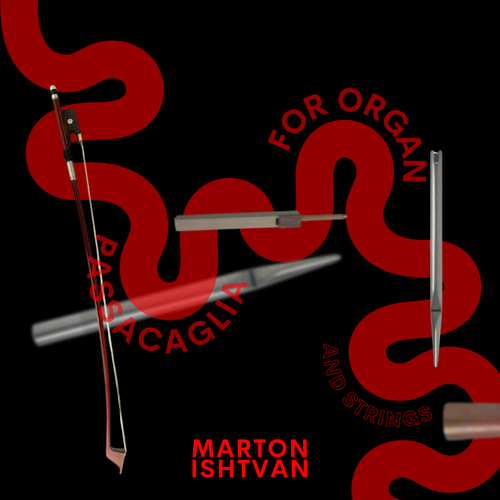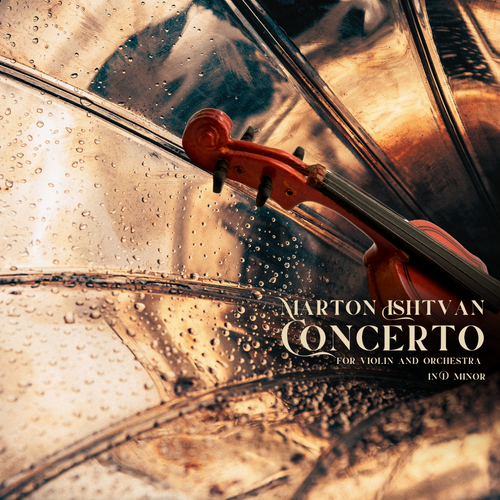Ishtvan Marton. Biography
Ishtvan Marton (1923-1996).
The composer Ishtvan (Stepan) Marton was born in 1923 in the village of Sofiya (Mukachevo district of the Zakarpattia region - Transcarpathia). His parents were avid music lovers, and from an early age, Ishtvan was drawn into music. After completing the village school, he studied at the Mukachevo Teacher Training Seminary, where he devoted a lot of time and attention to music and singing. Ishtvan Marton independently mastered playing the viola, cello, clarinet, accordion, and took private piano lessons, which fascinated him the most. It was at the seminary that the future composer's talent truly unfolded: he conducted the student orchestra and choir, composed music for them, and created arrangements for folk songs, giving them a new life.
At the age of 23 (1946), Ishtvan Marton worked as a teacher at the Mukachevo Music School and simultaneously completed his external studies at the Uzhhorod Music School in piano. From 1948, Ishtvan Marton worked as a concertmaster and teacher at the music school in Uzhhorod. Many of his students, including Yevhen Stankovych, Anatoliy Zatin, Viktor Tylychko, Mykola Popenko, later became well-known professional composers and performers.
In the early 1950s, he collaborated with the Zakarpattia Folk Choir, arranging folk songs for them and writing dance music that was recognized by the audience throughout the former USSR. Based on Zakarpattia Ukrainian, Slovak, and Hungarian folk motifs, the composer created the "Zakarpattia Suite" for choir and orchestra, Ukrainian "Pictures of Folk Festivities", and the vocal-choreographic composition "Zakarpattia Ornaments." For the orchestra of the Zakarpattia Folk Choir, led by Marton, he wrote "Verbunkosh and Csardas," "Suite of Hungarian Melodies", and other pieces.
In 1963, Ishtvan Marton became the artistic director of the Zakarpattia Regional Philharmonic, and from 1975, the artistic director of the Hungarian Chamber Ensemble of the Zakarpattia Regional Philharmonic. The composer also served as a jury member for regional creative competitions and festivals. His prolific creative and pedagogical activities, as a member of the Union of Composers of the USSR, were repeatedly highly praised by the public and specialists: he was a laureate of several competitions and an Honored Artist of Ukraine (1965).
In 1974, Ishtvan Marton contributed to the installation of an organ in the hall of the Zakarpattia Philharmonic, which was reconstructed and transported from the Moscow Grand Theatre. The composer passed away at the age of 72 in Mukachevo.
The creative legacy of the composer depicts a variety of musical genres: vocal, instrumental, and orchestral music. Among them are music for the comedy "Lily of the Valley Blooms", works for choir, organ, suites, sonatas, romances and songs, and pieces for chamber orchestra.
The composer is the author of the music for the artistic film "Over the Tysa River" and the documentary "In the Carpathians", the plays "Vernyhora" by Vasyl Vovchok, “Povin” (Flood) by Fedor Potushnyak, and others. These performances remain beloved and popular to this day.
The work of the Zakarpattia composer Ishtvan Marton is a vivid example of professionalism and versatility, where Zakarpattia, Slovak, and Hungarian folk motifs are skillfully interwoven.
The composer Ishtvan (Stepan) Marton was born in 1923 in the village of Sofiya (Mukachevo district of the Zakarpattia region - Transcarpathia). His parents were avid music lovers, and from an early age, Ishtvan was drawn into music. After completing the village school, he studied at the Mukachevo Teacher Training Seminary, where he devoted a lot of time and attention to music and singing. Ishtvan Marton independently mastered playing the viola, cello, clarinet, accordion, and took private piano lessons, which fascinated him the most. It was at the seminary that the future composer's talent truly unfolded: he conducted the student orchestra and choir, composed music for them, and created arrangements for folk songs, giving them a new life.
At the age of 23 (1946), Ishtvan Marton worked as a teacher at the Mukachevo Music School and simultaneously completed his external studies at the Uzhhorod Music School in piano. From 1948, Ishtvan Marton worked as a concertmaster and teacher at the music school in Uzhhorod. Many of his students, including Yevhen Stankovych, Anatoliy Zatin, Viktor Tylychko, Mykola Popenko, later became well-known professional composers and performers.
In the early 1950s, he collaborated with the Zakarpattia Folk Choir, arranging folk songs for them and writing dance music that was recognized by the audience throughout the former USSR. Based on Zakarpattia Ukrainian, Slovak, and Hungarian folk motifs, the composer created the "Zakarpattia Suite" for choir and orchestra, Ukrainian "Pictures of Folk Festivities", and the vocal-choreographic composition "Zakarpattia Ornaments." For the orchestra of the Zakarpattia Folk Choir, led by Marton, he wrote "Verbunkosh and Csardas," "Suite of Hungarian Melodies", and other pieces.
In 1963, Ishtvan Marton became the artistic director of the Zakarpattia Regional Philharmonic, and from 1975, the artistic director of the Hungarian Chamber Ensemble of the Zakarpattia Regional Philharmonic. The composer also served as a jury member for regional creative competitions and festivals. His prolific creative and pedagogical activities, as a member of the Union of Composers of the USSR, were repeatedly highly praised by the public and specialists: he was a laureate of several competitions and an Honored Artist of Ukraine (1965).
In 1974, Ishtvan Marton contributed to the installation of an organ in the hall of the Zakarpattia Philharmonic, which was reconstructed and transported from the Moscow Grand Theatre. The composer passed away at the age of 72 in Mukachevo.
The creative legacy of the composer depicts a variety of musical genres: vocal, instrumental, and orchestral music. Among them are music for the comedy "Lily of the Valley Blooms", works for choir, organ, suites, sonatas, romances and songs, and pieces for chamber orchestra.
The composer is the author of the music for the artistic film "Over the Tysa River" and the documentary "In the Carpathians", the plays "Vernyhora" by Vasyl Vovchok, “Povin” (Flood) by Fedor Potushnyak, and others. These performances remain beloved and popular to this day.
The work of the Zakarpattia composer Ishtvan Marton is a vivid example of professionalism and versatility, where Zakarpattia, Slovak, and Hungarian folk motifs are skillfully interwoven.
Іштван Мартон. Біографія
Іштван Мартон (1923-1996) – український композитор, педагог, мультиінструменталіст. Заслужений діяч мистецтв України (1972).
Іштван (Степан) Мартон народився 1923-го року в селі Софія, нині Мукачівського району Закарпатської області. Його батьки були великими поціновувачами музики, тому з дитинства залучали сина до музикування.
Після закінчення сільської школи Іштван навчався в Мукачівській вчительській семінарії, де багато часу й уваги приділяв музиці й співам. Самостійно опанував гру на альті, віолончелі, кларнеті, акордеоні та брав приватні уроки з гри на фортепіано, яке зацікавлювало його найбільше. Саме в семінарії по-справжньому розкрилось обдарування майбутнього композитора: він керував студентським оркестром і хором, писав для них музику, створював обробки народних пісень, даючи їм друге життя.
У 23 роки Іштван Мартон розпочав викладацьку роботу у Мукачівській музичній школі, паралельно закінчуючи екстерном Ужгородське музичне училище по класу фортепіано.
З 1948 року Мартон — концертмейстер і викладач музичного училища в Ужгороді. Він виховав чимало майбутніх композиторів та виконавців, серед яких Євген Станкович, Анатолій Затін, Віктор Теличко, Микола Попенко та інші.
На початку 50-х років співпрацював із Закарпатським народним хором, для якого він створював аранжування народних пісень і танцювальні композиції, які незмінно підкорювали публіку. На основі закарпатських українських, словацьких, угорських народних мотивів композитор створив "Закарпатську сюїту" для хору з оркестром, українські "Картинки народного гуляння", вокально-хореографічну композицію "Закарпатські орнаменти". Для оркестру Закарпатського народного хору, яким Мартон керував у 60-70-х роках, було написано "Вербункош і чардаш", "Сюїту угорських мелодій" та інші композиції.
У 1963 році Іштван Мартон стає художнім керівником Закарпатської обласної філармонії, з 1975 році — художнім керівником угорського камерного ансамблю Закарпатської обласної філармонії. Також композитор був членом журі обласних творчих конкурсів і фестивалів. Плідна творча і педагогічна діяльність члена Спілки композиторів Іштвана Мартона неодноразово високо оцінювалась громадськістю і фаховим середовищем.
У 1974 році Мартон долучився до встановлення органа в залі Закарпатської філармонії, який було реконструйовано та перевезено з Московського Великого театру. Помер композитор у віці 72 років у Мукачеві.
Творчий доробок композитора представлений багатьма жанрами вокальної, інструментальної, хорової, театральної та кіномузики. Серед них музика до комедії «Квітнуть конвалії», твори для хору, органа, сюїти, сонати, романси і пісні, твори для камерного оркестру. Композитор є автором музики до художнього фільму "Над Тисою" та документального "В Карпатах", вистав "Вернигори" Василя Вовчка, "Повінь" Федора Потушняка та інші. Ці вистави є популярними дотепер.
Творчість закарпатського композитора Іштвана Мартона є яскравим прикладом професійності, багатожанровості, в якій вдало сплелися закарпатські, словацькі, угорські народні мотиви.
Іштван (Степан) Мартон народився 1923-го року в селі Софія, нині Мукачівського району Закарпатської області. Його батьки були великими поціновувачами музики, тому з дитинства залучали сина до музикування.
Після закінчення сільської школи Іштван навчався в Мукачівській вчительській семінарії, де багато часу й уваги приділяв музиці й співам. Самостійно опанував гру на альті, віолончелі, кларнеті, акордеоні та брав приватні уроки з гри на фортепіано, яке зацікавлювало його найбільше. Саме в семінарії по-справжньому розкрилось обдарування майбутнього композитора: він керував студентським оркестром і хором, писав для них музику, створював обробки народних пісень, даючи їм друге життя.
У 23 роки Іштван Мартон розпочав викладацьку роботу у Мукачівській музичній школі, паралельно закінчуючи екстерном Ужгородське музичне училище по класу фортепіано.
З 1948 року Мартон — концертмейстер і викладач музичного училища в Ужгороді. Він виховав чимало майбутніх композиторів та виконавців, серед яких Євген Станкович, Анатолій Затін, Віктор Теличко, Микола Попенко та інші.
На початку 50-х років співпрацював із Закарпатським народним хором, для якого він створював аранжування народних пісень і танцювальні композиції, які незмінно підкорювали публіку. На основі закарпатських українських, словацьких, угорських народних мотивів композитор створив "Закарпатську сюїту" для хору з оркестром, українські "Картинки народного гуляння", вокально-хореографічну композицію "Закарпатські орнаменти". Для оркестру Закарпатського народного хору, яким Мартон керував у 60-70-х роках, було написано "Вербункош і чардаш", "Сюїту угорських мелодій" та інші композиції.
У 1963 році Іштван Мартон стає художнім керівником Закарпатської обласної філармонії, з 1975 році — художнім керівником угорського камерного ансамблю Закарпатської обласної філармонії. Також композитор був членом журі обласних творчих конкурсів і фестивалів. Плідна творча і педагогічна діяльність члена Спілки композиторів Іштвана Мартона неодноразово високо оцінювалась громадськістю і фаховим середовищем.
У 1974 році Мартон долучився до встановлення органа в залі Закарпатської філармонії, який було реконструйовано та перевезено з Московського Великого театру. Помер композитор у віці 72 років у Мукачеві.
Творчий доробок композитора представлений багатьма жанрами вокальної, інструментальної, хорової, театральної та кіномузики. Серед них музика до комедії «Квітнуть конвалії», твори для хору, органа, сюїти, сонати, романси і пісні, твори для камерного оркестру. Композитор є автором музики до художнього фільму "Над Тисою" та документального "В Карпатах", вистав "Вернигори" Василя Вовчка, "Повінь" Федора Потушняка та інші. Ці вистави є популярними дотепер.
Творчість закарпатського композитора Іштвана Мартона є яскравим прикладом професійності, багатожанровості, в якій вдало сплелися закарпатські, словацькі, угорські народні мотиви.


